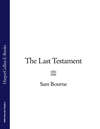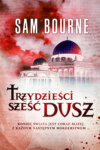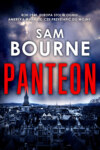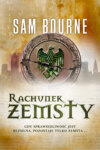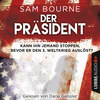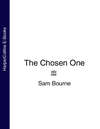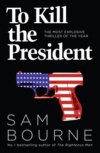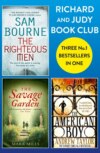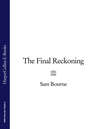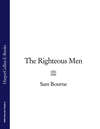Loe raamatut: «The Last Testament»

SAM BOURNE
THE LAST TESTAMENT

For my father, a testament to my love and enduring admiration
Table of Contents
Prologue
Chapter One
Chapter Two
Chapter Three
Chapter Four
Chapter Five
Chapter Six
Chapter Seven
Chapter Eight
Chapter Nine
Chapter Ten
Chapter Eleven
Chapter Twelve
Chapter Thirteen
Chapter Fourteen
Chapter Fifteen
Chapter Sixteen
Chapter Seventeen
Chapter Eighteen
Chapter Nineteen
Chapter Twenty
Chapter Twenty-One
Chapter Twenty-Two
Chapter Twenty-Three
Chapter Twenty-Four
Chapter Twenty-Five
Chapter Twenty-Six
Chapter Twenty-Seven
Chapter Twenty-Eight
Chapter Twenty-Nine
Chapter Thirty
Chapter Thirty-One
Chapter Thirty-Two
Chapter Thirty-Three
Chapter Thirty-Four
Chapter Thirty-Five
Chapter Thirty-Six
Chapter Thirty-Seven
Chapter Thirty-Eight
Chapter Thirty-Nine
Chapter Forty
Chapter Forty-One
Chapter Forty-Two
Chapter Forty-Three
Chapter Forty-Four
Chapter Forty-Five
Chapter Forty-Six
Chapter Forty-Seven
Chapter Forty-Eight
Chapter Forty-Nine
Chapter Fifty
Chapter Fifty-One
Chapter Fifty-Two
Chapter Fifty-Three
Chapter Fifty-Four
Chapter Fifty-Five
Chapter Fifty-Six
Chapter Fifty-Seven
Chapter Fifty-Eight
Chapter Fifty-Nine
Chapter Sixty
Chapter Sixty-One
Chapter Sixty-Two
Chapter Sixty-Three
Chapter Sixty-Four
Epilogue
Acknowledgments
About the Author
By Sam Bourne
Copyright
About the Publisher
PROLOGUE
Baghdad, April 2003
The crowd were pushing harder now, as if they scented blood. They charged through the archway and their combined weight pressed against the tall oak doors until they went crashing to the ground. As they rushed through, Salam moved with them. It was not a decision. He was simply a part of a moving beast made up of men, women and children, some even younger than him. They were a collective animal and now they gave a mighty roar.
They burst into the first vast hall, the glass of the display cases glinting in the silver moonlight that spilled through the ceiling-high windows. There was a brief pause, as if the beast were drawing breath. Salam and his fellow Baghdadis contemplated the scene before them. The National Museum of Antiquities, once Saddam's treasure house, bursting with the jewels of Mesopotamia, now laid wide open. There was not a guard in sight. The last of the museum staff had abandoned their posts hours earlier; and the few remaining security men had fled at the sight of this horde.
The brief moment of silence was ruptured by a sledgehammer crashing through glass. On that cue, the room was instantly filled with thunderous noise, as one after another they started wielding pistols, axes, knives, clubs, even heavy strips of metal torn from wrecked cars – anything to spring these precious, ancient objects from their cases.
Pane after pane of glass shattered. Ivory statues tumbled; ancient ceramic plates smashed to powder as they hit the floor. The room, usually blanketed in museum quiet, echoed now with a mighty din: the breaking of stone and glass, even gunshots as the most impatient shot out locks that refused to surrender to a crowbar. Salam noticed two well-dressed men setting to work methodically with professional glass-cutting equipment.
The ground trembled as wave after wave of people stampeded into the museum, ignoring this first exhibition hall, looking for fresh pickings elsewhere. They collided with those anxious to get out, hauling their priceless booty on handcarts, wheelbarrows and bicycles, or struggling under heavy plastic crates and cardboard boxes. Salam recognized a friend of his father striding out, his face flushed and his pockets bulging.
Salam's pulse was throbbing. In all his fifteen years he had never seen anybody behave like this. Until a few days ago everyone he knew had moved slowly, heads down, eyes averted. In Saddam's Iraq you knew better than to break the rules or draw attention to yourself. Now these same people – his neighbours – were wild in their desire, stealing anything they could lay their hands on and destroying the rest.
Salam reached into a broken case for a necklace made of pale orange and amber stones. But someone grabbed his wrist before he could grasp it: a middle-aged woman, eyes ablaze, blocking Salam with her left hand, stealing the necklace for herself with her right. He backed away.
It was like a scene from the sacking of an ancient city, Salam thought: an orgy driven not by lust, but by greed, the participants writhing with avarice, slaking an appetite that had been pent up for decades. Suddenly he was pushed forward again: a new group of looters had arrived and they were making for the stairwell.
Salam was swept along as they headed down a flight of stairs: a rumour had spread that the museum staff had stashed all the best stuff in the storerooms. He saw a knot of men standing around a door which they had clearly just lifted off its hinges. Behind it stood a freshly-constructed wall of cinder blocks, the cement barely set. First one man, then two, began hacking away at the bricks with hammers; others joined them using bars, even their shoulders. They turned to Salam.
‘Come on!’
They passed him a metal table leg.
Soon the hastily-assembled wall gave way, a sandcastle crumbling in the waves. The leader of the group stepped through the hole and at once began to laugh. Others quickly joined him. Salam could soon see the source of their joy: the room was packed with treasure – stone carvings of princesses and kings; etchings of rams and oxen; statues of buxom goddesses and Nubian women; ceramic jars, urns and bowls. There were copper shoes, fragments of tapestry and, on the wall, a frieze of soldiers fighting some long-forgotten war.
Salam's eye caught a few of the museum labels, still stuck to these hidden treasures. One identified a ‘lyre from the Sumerian city of Ur, bearing the gold-encased head of a bull, dated 2400 BC’. That was soon carted off. Next was a ‘white limestone votive bowl from Warka, dated 3000 BC’: Salam watched as it disappeared inside a football kit bag. A ‘statue representing King Entemena from Ur, dated 2430 BC’ took two men to lift and a third to navigate through the newly-opened hole in the wall. Salam remembered what they had taught him at school: that the Baghdad Museum contained treasures that were five thousand years old. ‘Inside that museum lies not just the history of Iraq,’ his teacher had intoned, ‘but the history of all mankind.’
Now it resembled nothing grander than a vegetable market, the customers scrapping over the produce. Except these were not squashed tomatoes or bruised peppers, but artwork and tools that had survived since the birth of civilization.
Salam could hear raised voices: two of the ringleaders were arguing. One slapped the other and the pair began to fight, bringing a metal bookcase stacked with pots crashing to the ground. Someone produced a knife. A man gave Salam a hard push in the back, shoving him towards the violence. Instinctively, he wheeled around, dived out of the hole in the cinder-block wall and ran.
He rushed down the stairs, hearing a new clamour at each landing. Every one of the eighteen galleries in the museum was now undergoing the same plunder. The noise scared him.
Salam kept heading down, flight after flight, until he had left the crowds behind: no one was bothering to come this far down now with such easy pickings higher up. He would be safely away from them here.
Salam pushed open a door and it moved easily. In the gloom he could see a few boxes of papers overturned, their contents carpeting the floor. Whoever was responsible had been right not to linger: this was merely an office. He noticed a few decapitated wires, dangling like the roots of an upended tree: someone had stolen the phones and fax machine and left the rest.
Maybe they had missed something, Salam thought. He tugged at the desk drawers, hoping to find a gold pen or even a cash-box. But all he found were a few old sheets of paper.
There was a larger drawer underneath; he'd give that one last pull and then he'd go. Locked.
He headed for the door only to catch his foot on a ridge by the desk. Salam looked down to find a loose stone square. His bad luck: all the others were flat and perfectly even. Hardly thinking, Salam wedged his fingers into the gap between the squares and prized out the loose one. It being too murky to see, he felt for the ground below – but his hand just sank into a narrow but deep hole.
Now he felt something solid; cool to the touch. It was a tin box. At last: money!
He had to lie on the ground, his cheek against the stone, in order to reach down far enough. His fingers struggled to grasp their target. The box was difficult to lift, but at last he got it out. It was locked; but its contents seemed too silent for coins and too heavy for notes.
He stood up, peering through the darkness until he found what he assumed was a letter opener lying on the desk. He slid it under the thin tin of the lid, leaning on the blade to lever up the metal. He did that all the way along one side, opening the box like a can of beans. By tipping it to one side, he could make the object inside slide out. His heart was pounding.
The second he saw it, he was disappointed. It was a clay tablet, engraved with a few random squiggles, like so many of the others he had seen tonight, many of them just smashed to the ground. Salam was about to discard it, but he hesitated. If some museum guy had gone to such lengths to hide this lump of clay, maybe it was worth something. Salam sprinted up the stairs until he could see moonlight. He had come out at the back of the museum, where he could see a fresh horde of looters breaking their way in. He waited for a gap in the line, then stepped through the broken-down exit doors. Running flat out, he slipped into the Baghdad night – carrying a treasure whose true value he would never know.
CHAPTER ONE
Tel Aviv, Saturday night, several years later
The usual crowd was there. The hardcore leftists, the men with their hair grown long after a year travelling in India, the girls with diamond studs in their noses, the people who always turned up for these Saturday night get-togethers. They would sing the familiar songs – Shir l'shalom, the Song for Peace – and hold the trusted props: the candles cupped in their hands, or the portraits of the man himself, Yitzhak Rabin, the slain hero who had given his name to this piece of hallowed ground so many years earlier. They would form the inner circle at Rabin Square, whether handing out leaflets and bumper stickers or softly strumming guitars, letting the tunes drift into the warm, Mediterranean night air.
Beyond the core there were newer, less familiar, faces. To veterans of these peace rallies, the most surprising sight was the ranks of Mizrachim, working-class North African Jews who had trekked here from some of Israel's poorest towns. They had long been among Israel's most hawkish voters: ‘We know the Arabs,’ they would say, referring to their roots in Morocco, Tunisia or Iraq. ‘We know what they're really like.’ Tough and permanently wary of Israel's Palestinian neighbours, most had long scorned the leftists who showed up at rallies like this. Yet here they were.
The television cameras – from Israeli TV, the BBC, CNN and all the major international networks – swept over the crowd, picking out more unexpected faces. Banners in Russian, held aloft by immigrants to Israel from the old Soviet Union – another traditionally hardline constituency. An NBC cameraman framed a shot which made his director coo with excitement: a man wearing a kippa, the skullcap worn by religious Jews, next to a black Ethiopian-born woman, their faces bathed by the light of the candle in her hands.
A few rows behind them, unnoticed by the camera, was an older man: unsmiling, his face taut with determination. He checked under his jacket: it was still there.
Standing on the platform temporarily constructed for the purpose was a line of reporters, describing the scene for audiences across the globe. One American correspondent was louder than all the others.
‘You join us in Tel Aviv for what's billed as an historic night for both Israelis and Palestinians. In just a few days’ time the leaders of these two peoples are due to meet in Washington – on the lawn of the White House – to sign an agreement which will, at long last, end more than a century of conflict. The two sides are negotiating even now, in closed-door talks less than an hour from here in Jerusalem. They're trying to hammer out the fine print of a peace deal. And the location for those talks? Well, it couldn't be more symbolic, Katie. It's Government House, the former headquarters of the British when they ruled here, and it sits on the border that separates mainly Arab East Jerusalem from the predominantly Jewish West of the city.
‘But tonight the action moves here, to Tel Aviv. The Israeli premier has called for this rally to say “Ken l'Shalom”, or “Yes to Peace” – a political move designed to show the world, and doubters among his own people, that he has the support to conclude a deal with Israel's historic enemy.
‘Now, there are angry and militant opponents who say he has no right to make the compromises rumoured to be on the table – no right to give back land on the West Bank, no right to tear down Jewish settlements in those occupied territories and, above all, no right to divide Jerusalem. That's the biggest stumbling block, Katie. Israel has, until now, insisted that Jerusalem must remain its capital, a single city, for all eternity. For the Prime Minister's enemies that's holy writ, and he's about to break it. But hold on, I think the Israeli leader has just arrived…’
A current of energy rippled through the crowd as thousands turned to face the stage. Bounding towards the microphone was the Deputy Prime Minister, who received a polite round of applause. Though nominally a party colleague of the PM, this crowd also knew he had long been his bitterest rival.
He spoke too long, winning cheers only when he uttered the words, ‘In conclusion …’ Finally he introduced the leader, rattling through his achievements, hailing him as a man of peace, then sticking out his right arm, to beckon him on stage. And when he appeared, this vast mass of humanity erupted. Perhaps three hundred thousand of them, clapping, stamping and whooping their approval. It was not love for him they were expressing, but love for what he was about to do – what, by common consent, only he could do. No one else had the credibility to make the sacrifices required. In just a matter of days he would, they hoped, end the conflict that had marked the lives of every single one of them.
He was close to seventy, a hero of four Israeli wars. If he had worn them, his chest would have been weighed down with medals. Instead, his sole badge of military service was a pronounced limp in his right leg. He had been in politics for nearly twenty years, but he thought like a soldier even now. The press had always described him as a hawk, perennially sceptical of the peaceniks and their schemes. But things were different now, he told himself. There was a chance.
‘We're tired,’ he began, hushing the crowd. ‘We're tired of fighting every day, tired of wearing the soldier's uniform, tired of sending our children, boys and girls, to carry guns and drive tanks when they are barely out of school. We fight and we fight and we fight, but we are tired. We're tired of ruling over another people who never wanted to be ruled by us.’
As he spoke, the unsmiling man was pushing through the crowd, breathing heavily. ‘Slicha,’ he said again and again, each time firmly pushing a shoulder or an arm out of his way. Excuse me.
His hair was silver grey, his chest barrelled; he was no younger than the Prime Minister. This wade through the throng was exhausting him; his shirt collar was darkening with sweat. He looked as if he was trying to catch a train.
He was getting nearer to the front now and was still pushing. The plain clothes guard in the third row of the crowd was the first to notice him, immediately whispering a message into the microphone in his sleeve. That alerted the security detail cordoning the stage, who began scoping the faces before them. It took them no time to spot him. He was making no attempt to be subtle.
By now the plain clothes officer was just a couple of yards away. ‘Adoni, adoni,’ he called. Sir, sir. Then he recognized him. ‘Mr Guttman,’ he called. ‘Mr Guttman, please.’ At that, people in the crowd turned around. They recognized him too. Professor Shimon Guttman, scholar and visionary, or windbag and right-wing rabble-rouser, depending on your point of view; never off the TV and the radio talk shows. He had made his name several summers ago, when Israel pulled out of Gaza: he camped out on the roof of a Jewish settlement, protesting that it was a crime for Israeli soldiers to be giving back land to ‘Arab terrorists, thieves and murderers’.
He was marching on, squeezing past a mother with a child on her shoulders.
‘Sir, stop right there!’ the guard called out.
Guttman ignored him.
Now the agent began making his own journey through the crowd, breaking through a small cluster of teenagers. He considered pulling out his weapon, but decided against it: it would start a panic. He called out again, his voice was instantly drowned out by sustained applause.
‘We do not love the Palestinians and they do not love us,’ the Prime Minister was saying. ‘We never will and they never will…’
The agent was still three rows away from Guttman, now advancing towards the podium. He was directly behind the older man; one long stretch and he could grab him. But the crowd was more tightly packed here; it was harder to push through. The agent stood on tiptoes and leaned over, just lightly brushing his shoulder.
By now Guttman was within shouting distance of the stage. He looked up towards the Prime Minister, who was coming to the climax of the speech.
‘Kobi!’ he yelled, calling him by a long-forgotten nickname. ‘Kobi!’ His eyes were bulging, his face flushed.
Security agents from all sides were now closing in, two on each side, as well as the first man advancing from behind. They were ready to pounce, to smother him to the ground as they had been taught, when a sixth agent, standing to the right of the stage, spotted a sudden movement. Perhaps it was just a wave, it was impossible to tell for sure, but Guttman, still staring maniacally at the Prime Minister, seemed to be reaching into his jacket.
The first shot was straight to the head, just as it had been rehearsed a hundred times. It had to be the head, to ensure instant paralysis. No muscular reflex that might set off a suicide bomb; no final seconds of life in which the suspect might pull a trigger. The bodyguards watched as the silver-haired skull of Shimon Guttman blew open like a watermelon, brains and blood spattering the people all around.
Within seconds, the PM had been bundled off the stage and was at the centre of a scrum of security personnel shoving him towards a car. The crowd, cheering and clapping thirty seconds earlier, was now quaking with panic. There were screams as those at the front tried to run away from the horrible sight of the dead man. Police used their arms to form a cordon around the corpse, but the pressure of the crowd was almost impossible. People were screaming, stampeding, desperate to get away.
Pushing in the opposite direction were two senior military officers from the Prime Minister's detail, determined to break the impromptu cordon and get to the would-be assassin. One of them flashed a badge at a police officer and somehow ducked under his arms and inside the small, human clearing formed around the body.
There was too little of the dead man's head to make out, but the rest of him was almost intact. He had fallen face down and now the officer rolled the lifeless body over. What he saw made him blanch.
It was not the shattered bone or hollowed eye sockets; he had seen those before. It was the man's hands, or rather his right hand. Still clenched, the fingers were not wrapped around a gun – but gripping a piece of paper, now sodden with blood. This man had not been reaching for a revolver – but for a note. Shimon Guttman hadn't wanted to kill the Prime Minister. He had wanted to tell him something.
